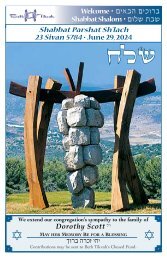You also want an ePaper? Increase the reach of your titles
YUMPU automatically turns print PDFs into web optimized ePapers that Google loves.
Welcome • ohtcv ohfurc<br />
Shabbat Shalom • ouka ,ca<br />
Shabbat <strong>Emor</strong><br />
6 Iyar 5782 • May 7, 2022<br />
Via<br />
Please join us for Minyan<br />
Monday, May 9 th - 7:30 p.m.<br />
Tuesday, May 10 th - 7:30 p.m.<br />
Tuesday, May 31 st - 7:30 p.m.<br />
Sunday morning minyanim 9:00 a.m.<br />
Kiddush Sponsors<br />
The Synagogue Board<br />
In Honor of The State of Israel's<br />
74 th Independence Day<br />
_____ _____<br />
Kiddush Maven: Linda Scheinberg<br />
Assisted by: Judy Adelman, Nancy Garfinkel, Elaine Kamin<br />
& Shep Scheinberg<br />
To sponsor a kiddush, please contact Linda Scheinberg<br />
missus205@gmail.com
Yahrtzeiten<br />
May 8 • Iyar 7<br />
May 9 • Iyar 8<br />
May 10 • Iyar 9<br />
May 11 • Iyar 10<br />
May 12 • Iyar 11<br />
May 13 • Iyar 21<br />
Birthdays<br />
May 8<br />
Aniversaries<br />
Lewis Grimley – Father of Susan Hammerman<br />
Bernard Wreschner – Father of Herbert Wreschner<br />
Joseph Mehlman – Father-in-law of Judith Mehlman<br />
Louis Ripps – Grandfather of Steven Chizzik<br />
Mark Lawrence – Nephew of Herbert Wreschner<br />
Barney Applebaum – Father of Heidi Gilbert<br />
Miriam Barber – Mother of Martin & Barry Barber<br />
Morton Macks – Father of Lawrence Macks<br />
Harry Hoffman – Father of Marcia Danoff<br />
Rose Goldenberg – Sister of Alan Rosenberg<br />
Marian Engel, Barrett Burka<br />
jna ,skuv ouh<br />
May 9 Jay rnt<br />
& Stuart Kaye (29)<br />
,arp<br />
Torah & Haftarah Readings:<br />
Shabbat <strong>Emor</strong>: Lev. 23:23-24:23 (Etz Hayim p. 727)<br />
1. 23:23-25 2. 23:26-32 3. 23:33-44 4. 24:1-4<br />
5. 24:5-9 6. 24:10-12 7. 24:13-23 M. 24:21-23 (p 733)<br />
Haftarah: Ezekiel 44:15-31 (Etz Hayim p. 735)<br />
Torah / Haftarah Summary<br />
D'var Torah:<br />
Power & Responsibility – Josh Cohen<br />
Parshat <strong>Emor</strong>, contains a variety of laws and prohibitions concerning Kohanim<br />
and dead bodies, his physical appearance, who he can marry, and when a Kohen<br />
is unfit for service. There are laws regarding the requirements and suitability of<br />
sacrifices, who may eat them and when, instructions for the Ner Tamid, as well as an<br />
overview of the obligations and schedule for Shabbat, Pesach, Sefirat HaOmer, Rosh<br />
Hashanah, Yom Kippur, and Sukkot. The parsha concludes with a story about the<br />
son of an Israelite woman who, in the heat of a fight, profaned the name of God and<br />
is sentenced to death by stoning. This event prompts God to deliver the final laws of<br />
the parsha which deal with civil restitution, wherein the famous phrase is recorded<br />
"eye for an eye and tooth for a tooth." (VaYikra 25:20).<br />
What connects this long and seemingly unrelated list of laws is the central value of<br />
holiness/sanctity, and the dual imperative to sanctify and NOT defile/profane. At the<br />
end of Chapter 22 Bnei Yisrael is instructed to observe these laws so that "You shall<br />
not profane My holy name, that I may be sanctified in the midst of the<br />
Israelite people - I the Lord who sanctify you." (VaYikra 22:32) This echoes back<br />
to last week's parsha, when God tells Bnei Israel that they "shall be holy, for I, the<br />
Lord your God, am holy." (19:2).<br />
But parshat <strong>Emor</strong> takes this further, exploring what holiness means through detailed<br />
rules regarding holy people (Kohanim/Priests), holy places (Mishkan/ Tabernacle),
holy things (Kodshim/Sacrificial Gifts) and holy time (Moadim/ Holidays). Since the<br />
Kohanim "are holy to your God" (21:7), a Kohen must observe the laws pertaining<br />
to cemeteries, shaving, and marriage so that "...he shall not defile himself...and so<br />
profane himself." (21:4). The holy people (Kohanim) must be careful about who<br />
enters the Mishkan lest, "He profane these places sacred to Me..." (21:23). Again And<br />
they must "be scrupulous about the sacred gifts that the Israelite people consecrate<br />
to Me, lest they profane My holy Name." (22:2).<br />
But parshat <strong>Emor</strong> takes this further, exploring what holiness means through detailed<br />
rules regarding holy people (Kohanim/Priests), holy places (Mishkan/ Tabernacle),<br />
holy things (Kodshim/Sacrificial Gifts) and holy time (Moadim/ Holidays). Since the<br />
Kohanim "are holy to your God" (21:7), a Kohen must observe the laws pertaining<br />
to cemeteries, shaving, and marriage so that "...he shall not defile himself...and so<br />
profane himself." (v.4). The holy people (Kohanim) must be careful about who enters<br />
the Mishkan lest, "He profane these places sacred to Me..." (v.23). Again And they<br />
must "be scrupulous about the sacred gifts that the Israelite people consecrate to Me,<br />
lest they profane My holy Name." (v.:2).<br />
Chapter 23's instructions regarding the Moadim are not accompanied by a charge<br />
against profanation, but as mikraei kodesh (holy occasions) reflecting this duality.<br />
Their sanctity calls not only to perform holy acts (sacrifices and other rituals), but<br />
also to refrain from mundane activities (work/melacha).<br />
Parshat <strong>Emor</strong> teaches that the holiness with which we are charged is not a stable state of<br />
being, it is an elevated status that requires perpetual safeguarding and sanctifying. Bnei<br />
Yisrael is holy so long as they behave accordingly: so long as the Kohanim honor and<br />
maintain their own holiness, so long as the Mishkan is protected from defilement, so long as<br />
the sacrifices are suitable and significant, and so long as the holidays are celebrated at their<br />
appointed times and in the proper manner. With the great power to sanctify, comes the great<br />
responsibility not to defile/profane.<br />
But what of the final laws of the parsha? Why does profaning God's name (in<br />
essence, using God's name to curse and not bless) require putting someone to death,<br />
and how does that connect to "an eye for an eye"? The overall message seems to<br />
be the reflexive nature of profanation and sin. Profane the holy, and you profane<br />
your own holiness. Violate someone's sanctity, and your sanctity is violated. Fail to<br />
protect God, and you forfeit God's protection.<br />
But there seems to be another level here as well. Verse 24:14 states that "all those<br />
who heard him should lay their hands on his head." This laying of hands,<br />
reminiscent of what is done with a sin offering, communicates that it is not only<br />
the blasphemer, but all those who heard him, who need expiation before God.<br />
Having heard someone profane God's name, their connection to God, indeed their<br />
very lives, are at risk. As we know from elsewhere in the Torah, when Israelites<br />
spurn God, people die. By laying hands on the blasphemer and then stoning him,<br />
the hearers purge themselves of their sin, and the community purges itself of the<br />
defilement in its midst, returning the community to the level of holiness needed<br />
to maintain God's protective presence. In essence, the blasphemer's life is forfeit<br />
because he made their lives forfeit. It's just that in this instance, God gave them a<br />
chance to fix things first.
D'var Haftorah:<br />
To Judge the Judge<br />
– Rabbi Mordechai Silverstein<br />
Ostensibly Ezekiel's message in the haftarah is part of a larger vision of the role of<br />
priests in the restored Temple. Ezekiel, who prophesied soon after the destruction<br />
of the first Temple, envisioned a priesthood with expanded responsibilities and<br />
regulations. He clearly saw the kohanim as both the spiritual and the temporal<br />
leadership of the nation. The kohanim were accorded, among their many roles,<br />
judicial responsibility: "In lawsuits, too, it is they who shall act as judges, they shall<br />
decide them (qere: yishpetuhu) in accordance with My rules." (Ezekiel 44:24).<br />
This translation is based on what we call the "qere" or "read tradition" of the Biblical<br />
text. It is to be contrasted with the "ketiv" or "written tradition" of the text. The "ketiv"<br />
represents the text as it is found written in the Bible itself. The "qere", on the other<br />
hand, is a parallel tradition of how the text is to be read. It is usually found in the<br />
margins of the Biblical text. The "pshat" or plain meaning of the text that Jews accept<br />
as authoritative usually follows the "qere" reading. Consequently, the verse quoted<br />
above, refers to the judicial responsibilities of the priests as leaders of the people.<br />
Rabbi Meir Simcha Hacohen from Dvinsk, the prominent 19 th -20 th century<br />
Lithuanian Talmudist, chose, however, to interpret the "ketiv" tradition of this text.<br />
Instead of reading the text as "they shall decide them", he adopts the reading "and<br />
be judged" (ketiv: v'shaphtuhu). According to this interpretation the verse reads: "In<br />
a lawsuit, they too shall stand trial, and they shall be judged according to my rules."<br />
This leads him to discuss the idea that no legal system should hold its leaders to<br />
a different standard of laws. Rather, when they need to be judged they should be<br />
tried by the same standards as everyone else. (See Meshech Hochmah Parshat <strong>Emor</strong>). This<br />
interpretation conforms to the following teaching from the Mishnah: "A High Priest<br />
(kohen gadol) may judge and be judged." (Sanhedrin 2:1)<br />
The Jewish tradition holds its leadership responsible not only as leaders but also as<br />
human beings. Position does not carry with it exemption from the consequences of<br />
the law. Rather, each of us is responsible for his/her actions, no matter what position<br />
one holds.<br />
IN ADDITION TO VACCINATIONS,<br />
MASKS ARE REQUIRED<br />
AT ALL TIMES<br />
“...rautn vhfnu`u vc ohehzjnk thv ohhj Jg”<br />
“She is a tree of life to those who embrace her;<br />
Remember<br />
those who<br />
Lunch-N-Learn<br />
hold her tight are happy…”<br />
with<br />
Rabbi Chorny Tuesdays at 12:15 P.M.<br />
Dedicate new leaves in commemoration of<br />
life’s joys & celebrations<br />
Please contact Linda Scheinberg: MISSUS205@GMAIL.COM or<br />
Harvey Rosenthal: HAROSENTHAL80@GMAIL.COM<br />
Beth Tikvah of Naples<br />
1459 Pine Ridge Road<br />
Naples, FL 34109<br />
(239) 434-1818<br />
Visit us online at<br />
bethtikvahnaples.org<br />
or scan the QR code<br />
to go there directly


















